新概念英语第二册34课课件剖析
新概念第二册34课课件

Questions?
6. Which way did she swim?
7. How long did she spend in the water?
8. How far did she swim?
9. When did she see a light ahead of her?
2.the local police,当地警察局。 local 可以表示"地方性的"或"当地的"、"本地的":adj. local
newspaper 地方性报纸
local news 本地新闻
local shops邻近的商店
第二十页
课ቤተ መጻሕፍቲ ባይዱ分析
3.Dan wondered why he was wanted by the police…丹奇怪 警察为什么找他…… (1) wonder表示"想知道"时后面往往跟疑问词引导的从句: She wondered who that man was/ what had happened. 她 想知道那个人是谁/到底发生了什么事。 (2) want用于被动语态时可以表示"想与(某人见面、谈话 等)"或"缉拿"、"追捕":
Spend, covered, saw, knew, near, cliffs, arrive, struggle up, remember, woke up, found, in hospital
A: Hello,… How are you feeling now?
B: …
A: You are so brave. We’re proud of you. May I ask you some questions?
(完整版)新概念英语第二册课件(Lesson-34-Quick-work)

★ most [ məust ] ad. 最;相当,非常 e.g. the most important discoveries a most interesting movie
worry ['wʌri] ['wɜ:ri] adj.表示“焦虑的”、“担心的” e.g.: She’s worry. vt. 表示“使担心/发愁” e.g.: Nothing worries me vi.表示“忧虑,担心” e.g.: She appears to be worried about
wonder= want to know wonder whether/if/who/when/where/what/why
+ 从句”
她想知道那个孩子在干吗。 She wondered what the child was doing. 我想知道他来不来。 I wonder whether/if he will come.
一只睡着的狗 a sleeping dog
一张焦虑的脸 a worried face
• Five days ago, the policeman told him, the bicycle was picked up in a small village four hundred miles away.
accept &receive? 他已经接受了我们的邀请。
He has accepted our invitation. 我没有收到你的传真。
I didn’t receive your fax. accept: 强调主动地或自愿地接受,或者说,经过考虑后同意
接受。
receive: 着重仅仅接到或收到这一结论或事实,而不含采取主 动或积极行动的意思。
新概念2精品课件Lesson34

课文精讲
There is always hope that…
老外比较偏爱
there be 结构。
课文精讲
1 there be 结构与情态动词连用。
也许有个… There may be better solution to the problem. 必须得… There must be a person to cook the dinner. 毫无疑问 There can be no doubt about it.
有个离家很近的公车站是个很大的优势 There being a bus stop near to the house is a great advantage.
课文精讲
We were annoyed at there being so much time wasted.
让人吃惊的是竟然没有任何反对意见 It would be surprising for there not to be any objections
Vocabulary
Fascination 魅力,迷惑力 中国艺术对她有很大的吸引力 Chinese art has a great fascination for foreigners. 。
结合26 exert an influence on…? Chinese art exerts great fascination on foreigners. 结合9:Cats never fail to fascinate human beings. Chinese art never fails to fascinate foreigners. 结合29:certain funny situations have a universal appeal. Chinese art holds a peculiar appeal for foreigners.
新概念英语第二册第34课原创课件剖析

• •
•
பைடு நூலகம்
Her parents worries about her weight. Her weight worries her parents.
6-10 ACBAC
11-14 BCBC
• 选择正确答案并填入空格 内
• • • • • •
1. past 2. passed 3. other;next 4. beach 5. found 6. arrested
• 完形填空 • 1-5 BACDB • 6-10 CDABC • 阅读理解 • 1-3 DCB
• • • • • • • • • • • • • •
6. Two people were ahead of us, and travelling fast. 有两个人在我们前面,走得很快。 7. The match lights easily. 这火柴容易划着。 8. I enjoy light wine. 我喜欢清淡的酒。 9. He is a light sleeper. 他睡觉易醒。(睡得浅) 10. She is light of foot. 她步伐轻快。 11. Let's see a light film for a change. 让我们看一场轻松的电影调节一下。 12. 这位老人一直在与病魔斗争。 The old man has been struggling with illness.
3. In the letter he was asked to call at the station.
新概念第二册Lesson 34 Quike work讲义

新概念第二册Lesson 34 Quike work一、单词精讲station /'steɪʃən/【释义】①n.(警察)局,所【例句】The lawyer spent most of the night in the police station.那个律师在警察局待了大半夜。
【释义】①站;车站;台【例句】I get off at the next station.我在下一站下车。
【释义】①身份,地位【例句】She was definitely getting ideas above her station.她明显是抱有超出自己身份的想法。
【搭配】space station 宇宙空间站railway station 火车站bus station 公共汽车(总)站power station 发电站of high station 高贵的TV station 电视台【联想】state /steɪt/ v.陈述←station→static /stætɪk/adj静态的;n.静电↓stationary/'steɪʃənri/adj.不动的,静止的most /maust/【释义】adv.①相当,非常【例句】We sat on the shore and watched the most beautiful sunset.我们坐在岸边观看那极为美丽的日落。
【释义】①(程度上),最多,最高【例句】What did you enjoy (the) most?你最欣赏的是什么?【释义】adj.①(数量上)最多,最大【例句】She spent most time on the first question.她在第一个问题上花的时间最多。
【释义】①大多数,几乎所有【例句】I like most vegetables.几乎什么蔬菜我都喜欢。
【释义】n.大多数,大部【例句】She spends most of her time travelling.她把大部分时间用在旅行上。
新概念英语第二册+Lesson+34+课件

• I called _o_n__ you five times yesterday. Were you out? • It’s too late go to dinner. Why don’t we call the whole thing _o_ff_? • We called _o_u_t_ to him but he could not hear us. • I called __at__ the post office on my way to work. • “Help!” the injured called _o_u_t_to the rescue team.
03
Grammar
call… (1)call at表示"对(某个人家或地方)进行短暂访问": He calls at every house in the street once a month. 他每月对这条街上的每户人家光顾一次。 He was asked to call at the police station. 他被告知去警察局一趟。 (2)call on 表示"拜访"、"探望": Have you called on George recently? 你最近去看过乔治吗?
4. He was amused too, because he never expected the bicycle to be found. amused:感到好笑的 amusing:令人发笑的 amuse V. 使发笑 expect sb to do sth. 期待某人做某事 expect sth to be done 期待某物被做 expect+that 从句 预料、预计... eg:他期望Linda 同他一起去。
最新新概念第二册34课课件

have\has taken pictures
the bike.
1.His bicycle had been ______________. 2. Five days ago, his bicycle was
____________ in a small village _______. 3. The bicycle is now being ________ to his home ____________. 4. The bicycle was _________ twenty years ago when Dan ___________.
most英音:[məust] 形容词 a. 1.(many, much的最高级)最多的;最高程度的
Which of you has made the most mistakes? 你们当中谁错得最多? 2.多数的;大部分的
Most birds can fly. 多数的鸟会飞。 代词 pron. 1.最大量,最多数,最高额[the S]
worried,surprised,amused,excited,amazed,shocked feel/get/become连系动词连用
all week =the whole week 2.the local police,当地警察局。 local 可以表示"地方性的"或"当地的"、"本地的":adj.
The pickpocket was brought to the nearby
police station. 小偷被带到附近的派出所。 3.广播电台,电视台;电视频道[C]
I don't like the program. What's on the other
新概念英语第二册34课PPT课件教学内容

call sb. up: 打电话给某人 她将在明天给你打电话。 She'll call you up tomorrow.
call off: 取消 天开始下雨,所以我们取消了比赛。 It began to rain so we called off the match.
4. Dan wondered why he was wanted by the police, but he went to the station yesterday and now he is not worried anymore.
wonder= want to know wonder whether/if/who/when/where/what/why + 从
句” 她想知道那个孩子在干吗。 She wondered what the child was doing. 我想知道他来不来。 I wonder whether/if he will come.
Dan Robinson has been worried all week. Last Tuesday he received a letter from the local police. In the letter he was asked to call at the station. Dan wondered why he was wanted by the police, but he went to the station yesterday and now he is not worried any more. At the station, he was told by a smiling policeman that his bicycle had been found. Five days ago, the policeman told him, the bicycle was picked up in a small village four hundred miles away. It is now being sent to his home by train. Dan was most surprised when he heard the news. He was amused too, because he never expected the bicycle to be found. It was stolen twenty years ago when Dan was a boy of fifteen !
新概念英语第二册Lesson34课课件(共46张PPT)

• the local police 当地警察局 • 1)地方的,本地的,地区的(尤作定语) • belonging to a particular place or
district • 属于某个特殊的地方或区域 • local news 当地新闻 • a local station 地方的一个车站 • local farmers 当地的农民
常好。
• very:客观的陈述 • 例:He is very tall. 他非常高。
• 2) adv.最(修饰动词,但不放在动词和 它的宾语之间)
• 例:What' s troubling you most?什么 事情令你最麻烦?
• What most pleased me was that. . . . .
• local government 当地政府 • local time 当地时间 • local color 地方特色 • 2)(身体)局部性的 • a local pain 局部疼痛 • 3) a local line 支线 • a local train 普通列车
• …… has been worried all week.
• 当Dan听到这个消息时非常吃惊。
• This is a most useful book. 这是一 本非常有用的书。
• He was most polite to me. 他对我非 常礼貌。
• most与very区别: • most:表示观的感情, 见解 • 例:He was most kind to me.他对我非
Think about how the writer organizes the story and try to retell it.
新概念英语第2册课件Lesson34(共34页)

【课文讲解】
• 1、Quick work • quick adj. 动作的快; fast adv. 速度的快;
soon adv. 时间快 • have a quick meal • quick freeze 速冻 • 这篇题目取为quick work的涵义?
• 2、Ted Robinson has been worried all the week.
• wonder表示“想知道”时后面往往跟疑问 词引导的从句
• She wondered who that man was/what had happened.
• want用于被动语态时可以表示“想与(某 人见面、谈话等)”或“缉拿,追捕”
例子:This is the man (who is) wanted by the police.
adv. 相当,非常
• ① adj. 用于最高级,表示“最……”
This is the most beautiful car I’ve even seen.
• ② adj. 大多数的,大部分的
Most doctors don’t smoke.
• ③ adv. 非常,很(相当于very,但通常用于表达主观感情、 见解等)
• Ted Robinson has been worried all the week. Last Tuesday he received a letter from the local police. In the letter he was asked to call at the station. Ted wondered why he was wanted by the police, but he went to the station yesterday and now he is not worried any more. At the station, he was told by a smiling policeman that his bicycle had been found. Five days ago, the policeman told him, the bicycle was picked up in a small village four hundred miles away. It is now being sent to his home by train. Ted was most surprised when he heard the news. He was amused too, because he never expected the bicycle to be found. It was stolen twenty years ago when Ted was a boy of fifteen !
新概念英语第二册Lesson34Quickwork课件

3. call back (1) 唤回,叫回 Call sb back 把某人叫回来 翻译“他正要离去,他妻子把他叫了回来。” He was about to leave when his wife called him
back. (2)回电话,再打电话。 如:I’ll call (you) back. 我将给你回电话。 翻译 “他不在家,请过一会儿再打来” He’s not in. Please call back later.
Five days ago, the policeman told him, the bicycle was picked up in a small village four hundred miles away.
pick up a) 拿起,拾起: 电话铃一响,我就拿 起了话筒。
I picked up the receiver as soon as the phone rang. b) 用车接人: 我来办公室接你。
Words and expressions
station n.
post office 邮局 police office 警局
相近:bureau 局 communication bureau 交通局
most adv. 相当,非常 ① adj. 用于最高级,表示“最……” This is the most beautiful car I’ve even seen. ② adj. /pron. 大多数的,大部分的 Most doctors don’t smoke. Most of the students are here. 最大量,最多数,最高额 I did the most I could. 我已尽最大的努力去做了。 ③ adv. 非常,很(相当于very,但通常用于表达主观感情、见解等) 只有加“the”时译为“最”,加“a”或什么也不加时译为“非常,相当 ”(“very” 的概念),常与形容词作用的过去分词连用。 a most interesting book 非常有趣的书 I was most surprised when I heard the news. 我非常惊讶
新概念英语第二册-Lesson34-Quick-Workppt课件

Now, let us listening!
Chinese first
.
Now, let us listening!
English again
.
Dan Robinson has been worried all week.
时态:
.
Text analysis
1. Dan Robinson has been worried all week. worry: vi, about be worried A dog worries a bone?
Q : Who was th.e murderer?
.
5=B 就是硼 57=La 镧 6=C 碳 19=K 钾 合起来557619就是black
.
• Now listen the video, and answer the question:
How long had the police taken to find his bicycle?
.
• Created by Sir A. Conan Doyle • London, 221B Baker Street. • Well-known cases: The Sign of Four, The Hound of the Baskervilles, A Study in Scarlet (血红色).
“557619” Later in their investigation, the police listed four suspects who might have killed him:
• Paul, 23 years old, a talkative but quite clever young student.
新概念英语第二册第三十四课PPT课件Lesson 34 Quick work

has been done
过去完成时
had been done
Lesson 34 Quick work
Grammar 被动语态常用于下面的情况中: 1. 当我们不知道谁是动作的执行者时。如: Printing was introduced into Europe from China. It was stolen twenty years ago when Dan was a boy. 2. 当我们认为没有必要指出或不想指出谁是动作的执行者时。如: In the letter he was asked to call at the police station. It is now being sent to his home by train. The policeman told him, five days ago, the bicycle was picked up in a small village. Television ads are usually repeated over and over again. 3. 虽然需要同时指出动作的执行者,但我们强调或突出的是动作的承受者,此时 动作的执行者用介词by加代表动作执行者的名词或代词表示。如: Dan wondered why he was wanted by the police. At the station, he was told by a smiling policeman that his bicycle had been found.
Lesson 34 Quick work
Listen to the tape of the passage and then repeat the sentence one by one. Dan Robinson has been worried all the week. Last Tuesday he received a
新概念英语第二册Lesson34课件

a recent important exam. • Chris, 19, a quiet polite young student, who was very talented
• a smiling policeman ,一位面带笑容的警 察 ,smiling 为现在分词,作定语
• 一只睡着的狗 • a sleeping dog • 一张焦虑的脸
a worried face
Five days ago, the policeman told him , the bicycle was picked up in a small village four hundred miles away. 这句话实际上是一个间接引语(cf.第15课语 法),其正常语序应为: The policeman told him that five days ago the bicycle was picked up… 语序变化后,the policeman told him成了插入成分
anymore.
wonder ①v.想知道 =want to know • wonder +whether/if/what/ who/ when/where/why 从句 她想知道那个孩子在干嘛?
She wondered what the child was doing. 我想知道他来不来。
I wonder whether he will come. • ②v.感到奇怪 ~at • ③n.惊奇,奇迹 • in wonder 惊奇地 • 她惊奇地看着我。 • She looked at me in wonder.
新概念英语第二册课件Lesson34(共14页)

Lesson 34 Quick work
The bicycle was picked up in a small village four hundred miles away.
Lesson 34 Quick work
Dan wondered why he was wanted by the police, but he went to the station yesterday and now he is not worried any more.
wonder v. (want to know)
Lesson 34 Quick work
Dan wondered why he was wanted by the police, but he went to the station yesterday and now he is not worried any more.
wonder: +at/ about 感到惊讶,感到奇怪
a sleeping dog a flying bird a crying baby
Five days ago, the policeman told him, the bicycle was picked up in a small village four hundred miles away.
The door will be opened by me.
Lesson 34 Quick work
新概念英语第二册课件(Lesson-34-Quick-work)剖析

她是在巴黎学会法语的
4)(无意地,顺便地)获得,找到: e.g.: I've picked up a bad cold.
我得了重感冒
5、Dan was most surprised when he heard the news. most adv.相当,非常(修饰adj) e.g.: This is a most useful book. e.g.: He was most polite to me. 他对我非常礼貌
她在维多利亚车站下了车
New words and expressions ★ station [ 'steiʃən ] n. 车站, 站, 局, 駐地
railway/bus station
police station
TV station
army station
bureau
n. (經)局,办公处
Price Bureau Tax Bureau ★ most [ məust ] ad. 最;相当,非常
-He/She is a
policeman (policemen)
Police Station
-Where does he/she work?
-He/She works
-What does he/she do?
-He/She is a
pilot
-What does he/she do?
-He/She is
4、Five days ago, the policeman told him, the bicycle was picked up in a small village.
pick up 1) 拿起,拾起:
e.g.: I picked up the phone as soon as the
- 1、下载文档前请自行甄别文档内容的完整性,平台不提供额外的编辑、内容补充、找答案等附加服务。
- 2、"仅部分预览"的文档,不可在线预览部分如存在完整性等问题,可反馈申请退款(可完整预览的文档不适用该条件!)。
- 3、如文档侵犯您的权益,请联系客服反馈,我们会尽快为您处理(人工客服工作时间:9:00-18:30)。
• The pickpocket was brought to the nearby police station. • 小偷被带到附近的派出所。 • I don't like the program. What's on the other station? • 我不喜欢这个节目。另外那个台在上演什么? • 2) n.车站 • A railway station 火车站 • A bus station 汽车站 • She got off at Victoria Station. • 她在维多利亚车站下了车。
• 3) station to station • 打长途电话时,不管对方由谁接听,电 话接通即开始计费 • person to person • 只有指定的对象接听电话时才付费
• most
• 1) adv.相当,非常(用于加强语气;修 饰adj.前面可加不定冠词) • 例: Dan was most surprise when heheard the news. • 当Dan听到这个消息时非常吃惊。 • This is a most useful book. 这是一 本非常有用的书。 • He was most polite to me. 他对我非 常礼貌。
• most与very区别: • most:表示观的感情, 见解 • 例:He was most kind to me.他对我非 常好。 • very:客观的陈述 • 例:He is very tall. 他非常高。
• 2) adv.最(修饰动词,但不放在动词和 它的宾语之间) • 例:What' s troubling you most?什么 事情令你最麻烦? • What most pleased me was that. . . . . • What pleased me most was… 令我最 高兴的事是。
New Concept English 2
Lesson 34
Quick work
Tell me about yourself.
•Did you do anything special yesterday?
•What’s your favorite movie?
• When was the last time you travel?
• 3)构成adj./adv.的最高级)最,最 多 • 例: This is the most interesting p的最有趣的照片。 • The new employee worked (the) most vigorously of all. • 所有人当中工作起来最积极的是那些新 来的雇员。
• Have you ever been to a police station?
• Have you been on the scene of a crime?
• Do you have a favorite detective?
• Di Renjie (狄仁杰) • A Real person in history, (who was) in charge of the judicature (司法) in Tang Dynasty(朝代). • Solved 18000 cases within a year, which might be the reason why he was admired as a competent(有能力的) detective.
Are you a potential (潜在的)
Detective?
Key words & expressions
• station
• 1) n.(政府机关等)局、所、中心;供应站; (广播)电台 • a police station 警察局 • a fire station 消防局 • a power station 供电局 • a filling station 加油站 • a filling gas station • a broadcasting station 广播电台 • TV station 电视台
Danthe Robinson • •Read text and find answers to these questions:
• How Last Tuesday…… (receive, be asked, wonder) 1. did Dan Robinson feel this week? Why? 2. did he do? (go, be told) • What Yesterday…… • Listen again, and read aloud after 3. How did he feel now? • • Now Five days ago…… (tell,and be picked up) watch the video, answer the question: the speaker. 4. What did the policeman tell him? • How Now…… (be sent) long had the police taken to find his 5. What did he think when he heard news?be • bicycle? When he heard the news…… (bethe surprised, 6. What happened to his bicycle when he was fifteen? amused, expect, be stolen)
• Song Ci (宋慈), in Song Dynasty • Considered the first professional medical examiner (法医) in the world. • Comprehended the unique skill of dissecting (解剖) dead bodies that helped him solve some most difficult cases.
• 4) many和much的最高级many--more-most • much--more--most • 5) most绝大多数的(前面不加冠词) • 例: Most of the boys like football. • 大多数的男孩喜欢足球。 • Most of them were late. 他们中的 大多数都迟到了。
